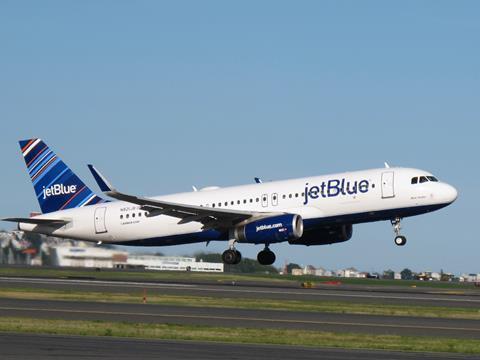The US Department of Transportation (DOT) is receiving more pressure to re-examine an already-approved revenue-sharing partnership between American Airlines and JetBlue Airways.
Heightened pressure has come in the first week of the administration of President Joe Biden, who took office just days after the DOT green lighted the American-JetBlue deal.
United Airlines, Spirit Airlines and consumer advocacy group Travelers United are urging the agency to halt its approval and take a second look. They cite competitive concerns and say the DOT made its decision behind closed doors and without industry input.

“Travelers United asks the incoming DOT administration to begin a new, transparent, on-the record review of the proposed AA/JBU partnership,” says the group in a regulatory filing made public on 25 January. The filing is dated 22 January.
“The recent DOT approval was the product of secret deliberations, and we call on the new administration to champion greater transparency,” the group adds.
United Airlines urges the DOT to “pause” the deal’s implementation, release all relevant documents and give industry an opportunity to comment, according to its filing, also released 25 January. United says the DOT’s review “lacked transparency”.
On 10 January, in the closing days of President Donald Trump’s administration, the DOT approved, with conditions, the proposed American-JetBlue business deal.
The carriers plan to operate codeshare flights and offer reciprocal frequent flier benefits on flights from New York and Boston. The deal also includes “sharing of existing assets, marketing, planning and revenue sharing”, according to DOT documents.
American and JetBlue have said their plan would benefit consumers by enabling them to offer more routes and seamless travel between their networks.
In approving the deal, the US government required the airlines give up seven take-off and landing slots at New York John F Kennedy International airport and six at Ronald Reagan Washington National airport.
But Spirit Airlines says lack of information from the DOT has left the industry unclear “whether the conditions accepted by American and JetBlue will offset the anticompetitive impact to any relevant degree”.
“The American/JetBlue alliance runs directly counter to the decade-long effort by the department and the Department of Justice to promote competition at all the airports involved in this agreement,” Spirit adds. “The risk of competitive harm and the negative impact on consumers cannot be overstated, as the two carriers move forward with their joint venture.”
Travellers United calls the DOT’s slot-divestiture requirements “laughable and totally inadequate to counterbalance the anti-competitive impacts of this deal,”
It argues that the American-JetBlue deal would undermine conditions that the US government set when approving, in 2013, the American-US Airways merger. That approval required American divest slots at Washington National, some of which JetBlue later acquired.
“The slot divestitures should be doubled at DCA and JFK, and the same level of divestitures should be added to LGA as well,” Travellers United says.
The DOT says it will evaluate industry feedback “in due course and determine if there is sufficient basis to conclude that an investigation would be in the public interest”.
JetBlue says, “The alliance is moving forward after an approximately six-month review by the Department of Transportation, and both airlines have made a series of commitments to DOT that ensure the alliance delivers benefits to customers.”
The join-up, JetBlue insists, will lead to more low fares and additional routes.
“By connecting our domestic and international networks in the Northeast, we are creating a viable competitor to the dominant global carriers, especially on routes that are currently served by only one airline charging high fares,” JetBlue adds.


























